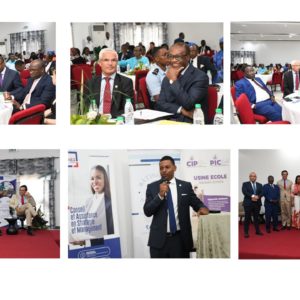African companies, move on, the state will join you! 60 years after independence, African unity remains a goal towards which peoples tend faster than politicians. Beneath its utopian exterior, the idea of united African companies can be baptized from the inside by entrepreneurs who are united and eager to build another destiny for Africa. Here’s why and how.
In 60 years, the state failure in Africa has been widely documented. The betrayal of politicians continues to hit the headlines without undermining Africans’ desire to be an entrepreneur. While waiting for the real state, the time has come for the private sector to designate an external target, to redefine the responsibility of large African groups towards small and medium enterprises (SMEs) and very small enterprises (TPE) and to train to hunt in packs for a united and conquering Africa.
In countries in critical situation, the mindset of young entrepreneurs influences the way in which they act and the quality of the resulting results. Faced with an identified need, they take action and no longer bother with pretext. They don’t or very little expect from the state. They advance. On the move, they dare, take initiative, resist fears and transform threats and opportunities. From passive, they become active and proactive. They act on the present so that tomorrow is better.
As it stands, the vast majority of African companies do not individually control all of the factors that are involved in their activities. Very few, including the national champions, can manage to remain competitive in space and time on their own. Moreover, due to a lack of a robust positioning, many of them miss out on decisive opportunities for their existence and their growth both in their domestic market and internationally.
In this environment wrought by antagonisms and uncertainty, intelligent alliances will enable companies to identify and fill their weak points in terms of knowledge, know-how and skills in a short time. Selected from among the best in their sector, the companies concerned will be encouraged to conduct their actions outside Africa based on a solidarity pact with larger or smaller firms, whether or not they are their direct competitors.
The segments with high competitive value will be the foundations on which the companies elected at the national and then continental levels will have to rest. These will be export-oriented companies hired for a limited period to allow the autonomy of elected entities. The selected companies should ideally have international experience and be clearly active in their prospecting process. They must be able to offer a product or service and have sufficient financial resources to carry out the establishment project.
This win-win approach for both parties will allow large companies to enrich their offerings and give themselves maximum chances of winning tenders. Concretely, the large groups will bring together subcontracting SMEs and VSEs to reflect on the products and services that they could provide within the framework of international competitions. SMEs and VSEs will thus more easily develop their turnover abroad. This approach will be the mark of a united and united Africa in the achievement of common objectives in the economic field.
Asked about their international shortcomings, African entrepreneurs still question the lack of state support, the lack of knowledge of the territory, the lack of networks and links with influential actors in the target country. However, brakes on daring and the causes of failure can be avoided. Because if the entrepreneur lacks points of approach, he has little chance of daring and succeeding in conquering the foreign market. To overcome these limiting factors and give yourself every chance to break through internationally, the time has come to activate entrepreneurial solidarity.
The Entrepreneurial Solidarity Pact (PSE) will be a mechanism for training a large group to help a small business penetrate a foreign market at a lower cost. The bearer will voluntarily provide an SME / VSE with its network, its experience in the territory in question, its practices and already proven resources. This competition, in terms of knowledge and infrastructure, will provide valuable assistance to SMEs or very small businesses, which will thus benefit from an effective springboard to successfully establish themselves or sell their products outside the African continent.
A code of conduct as well as a collaborative platform will emerge from the PSE, allowing both the sharing of good practices and a network of qualified actors. In any case, a convention will be essential to clarify the roles and responsibilities of the parties to this pact, which should be beneficial for all.
Establishing business relationships – Large groups will put SMEs and VSEs in touch with foreign customers and operators, giving them the benefit of their contacts. This support will allow smaller players to speak directly to ordering parties and customers potentially interested in their offers by presenting themselves as partners recommended by recognized groups. This type of support will thicken the credibility of SMEs / VSEs and will more easily open the doors to them.
Business intelligence and business intelligence – A firm will share with others the product of monitoring a sector, players, standards, as well as advice and due diligence on specific targets. It will help perfect their market research and provide them with key information about doing business in the target country.
Collective and strategic intelligence – Large groups will be able to collect data for the benefit of smaller players and vice versa, promote high quality African products / services or even prospect for a market for the benefit of several small companies in exchange for their services.
Legal and Business Support – One firm will offer another firm help to quickly understand the legal and business environment of the target country. The large group will thus be able, in exchange for a clearly defined service, to support the SME or VSE partner in the drafting of its contracts under the rule of local law as well as on tax or customs matters of the territory concerned.
Logistics solidarity – Large African groups will offer SMEs and VSEs with high potential the provision of business premises or accommodation for staff, even during exhibitions abroad or in international trade fairs, never in a spirit of gratuity, always with a view to shared gains.
Mentoring will allow large African groups prepositioned abroad to welcome and supervise volunteers assigned on the spot on behalf of an SME or a very small business in exchange for a service. It is essential, for the success of the process, that it never be a question of charity, but indeed of professional solidarity.
The alliance will be a lever for acquiring new skills and improving the competitiveness of allied companies. It will involve sharing a well-defined doctrine and a clear state of mind in a climate of mutual trust in order to maintain this cooperative relationship in a defined time and space.
Coopetition will aim to train and encourage African companies to cooperate, in the more or less long term, with competition. It will provide the actors concerned with the double benefit of cooperation and competition. It will thus become the appropriate relationship strategy to outperform together abroad. Intervening primarily in activities for which the parties do not have a competitive advantage, coopetition will offer the possibility of making savings to conquer an external market or to protect the domestic market.
The joint venture will bring together two or more companies around a clearly defined international project. The objective of this collaboration, the modalities of which will be specified with the greatest rigor, will be to enable African companies to share their resources, profits, expenses and even possible losses. The advantage of this form of solidarity is that it will constitute a legal entity distinct from the other business interests of the parties involved.
All in all – To dare the united companies of Africa is to afford an operational device to take advantage of the whole offensive aspect of the African Continental Free Trade Area (AfCFTA). This is to seize the opportunity to hand over to the uninhibited African company its role as a real engine of development and conquest. It is to materialize the desire of the peoples and African solidarity in the common creation of wealth while waiting for States … The African Center for Economic Intelligence and Intelligence (CAVIE) is ready to animate this dynamic at the continental level by relying on, at the national level, on investment promotion agencies.



